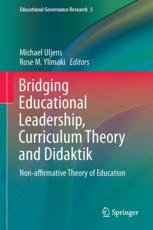

Most ebook files are in PDF format, so you can easily read them using various software such as Foxit Reader or directly on the Google Chrome browser.
Some ebook files are released by publishers in other formats such as .awz, .mobi, .epub, .fb2, etc. You may need to install specific software to read these formats on mobile/PC, such as Calibre.
Please read the tutorial at this link. https://ebooknice.com/page/post?id=faq
We offer FREE conversion to the popular formats you request; however, this may take some time. Therefore, right after payment, please email us, and we will try to provide the service as quickly as possible.
For some exceptional file formats or broken links (if any), please refrain from opening any disputes. Instead, email us first, and we will try to assist within a maximum of 6 hours.
EbookNice Team

Status:
Available0.0
0 reviewsThis book is open access under a CC BY 4.0 license.
This volume argues for the need of a common ground that bridges leadership studies, curriculum theory, and Didaktik. It proposes a non-affirmative education theory and its core concepts along with discursive institutionalism as an analytical tool to bridge these fields. It concludes with implications of its coherent theoretical framing for future empirical research.
Recent neoliberal policies and transnational governance practices point toward new tensions in nation state education. These challenges affect governance, leadership and curriculum, involving changes in aims and values that demand coherence. Yet, the traditionally disparate fields of educational leadership, curriculum theory and Didaktik have developed separately, both in terms of approaches to theory and theorizing in USA, Europe and Asia, and in the ways in which these theoretical traditions have informed empirical studies over time. An additional aspect is that modern education theory was developed in relation to nation state education, which, in the meantime, has become more complicated due to issues of ‘globopolitanism’. This volume examines the current state of affairs and addresses the issues involved. In doing so, it opens up a space for a renewed and thoughtful dialogue to rethink and re-theorize these traditions with non-affirmative education theory moving beyond social reproduction and social transformation perspectives.